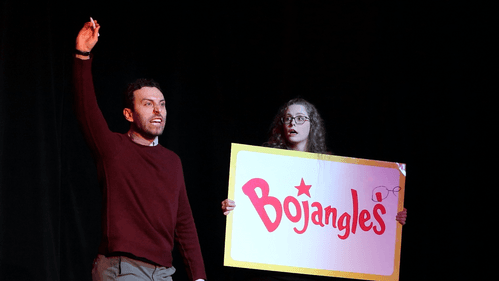Stay in the Loop
BSR publishes on a weekly schedule, with an email newsletter every Wednesday and Thursday morning. There’s no paywall, and subscribing is always free.
Love languages
Pier Players Theatre Company presents Jeffrey Barg and David Lee White’s The Angry Grammarian

Conversations about grammar often carry political undertones. Linguistic liberals see language as ever-changing, a corpus of fluid meanings and alternate forms. Meanwhile, the conservative approach to grammar, while conceding that such change is (regrettably) unavoidable, insists that we do our best to uphold the rules. It’s diversity and inclusion versus law and order, just like always.
With grammar, though, the most pressing concern is not political but epistemological: how do we know what is correct?
The title character of Jeffrey Barg and David Lee White’s new musical The Angry Grammarian (currently enjoying a sold-out run on the Theatre Exile stage) knows what’s correct, and he wants you to know that he knows. Pier Players Theatre Company presents the story of Greg, a grammar bully of the highest order, the kind of relentless pedant who privately doesn’t want people to actually heed his advice since such a state of affairs would make his existence redundant. Will the Angry Grammarian weep when there are no more terminal prepositions to scoff at?
Falling in love with grammar
As played by Benjamin Behrend, Greg is so sweet and likable that it’s actually kind of hard to buy him as an angry anything. Anyone who’s ever met one of these specimens knows that the key ingredient in the grammarian’s DNA is condescension. These are people who walk around with their chins thrust heavenward, smirking from on high at the plebs and peasants who don’t know conjunctions from conjunctivitis.
Greg is never condescending, nor is his love interest, Lisa, played by Chelsea Cylinder. Greg writes a newspaper column called the Angry Grammarian (inspired by Barg’s long-running Inquirer column of the same name) where he answers readers’ questions about you-know-what. Lisa is his biggest fan, a fellow grammar maven whose fixation on the Angry Grammarian borders on sexual even before our asterisk-crossed lovers finally meet. When they do, it’s love at first comma splice.
What the leads lack in conspicuous contempt for the grammatically challenged, they make up for in pure open-hearted zeal for their own little corner of geekdom. Perhaps a legitimately angry grammarian would be too obvious, too done-to-death. What we need more of are people like Greg and Lisa: lovers of language in all its whimsical machinations, who see rules not as restrictions but as guideposts on the way to concision and precision in the wielding of the written word.
At first, our lovers’ love seems to have a softening effect on their shared disdain for acts of lexical indecency. Not long after they get together—to the tune of “Lie with Me and Lay Me," one of Barg and White’s more successful attempts at cheekiness—Greg and Lisa sing the praises of the singular they in “They’re There.” It wasn’t so long ago that the rule against the singular they was routinely observed, and to question it was to invite Himalayan altitudes of disdain from the professional stickler. It’s refreshing to see passionate defenders of grammatical harmony throw open their arms in acceptance of this versatile pronoun and its ever-increasing importance to modern life.
Language is the engine
Ah, but every stickler has their sticking point, the scalding-hot issue on which they absolutely will not budge. For our lovers, it’s the notorious Oxford comma: friendship-ruiner, marriage-ender, a riddle wrapped in an enigma baked in a buttery, flaky crust.
As it has done for so many of us, the Oxford comma drives a wedge between the once and future bedfellows. With the help of Greg’s newspaper editor, played by the very funny Abrham Bogale, an all-out feud is cooked up between the two. Their disagreement spills out onto the pages of Greg’s newspaper, as well as the airwaves carrying Lisa’s new project, a podcast called (get ready for it) Comma Sutra.

Yes, it would have been all too easy for The Angry Grammarian to be little more than a one-way ticket to the pun parade. And to be sure, there’s no shortage of wordplay here—from the cute (“The Right Space,” in which our heroes debate the number of spaces to put between two sentences) to the cringey (steel yourself for “Bring in Da Funk, Bring in Da Wagnalls”). But Barg and White know that at the heart of their piece is a sincere love for the cacophonous chaos that is language, and that love enriches both the songs and the scenes. In The Angry Grammarian, language, and the way it touches those of us who genuflect at its altar, is the engine of the story.
Lifting the grammar gates
Of course, it doesn’t hurt to have great actors, and the Pier Players manage to assemble some impressive talent here. Every romcom lead needs a funny sidekick, and the two we get here are absolute gems. In the role of Greg’s best friend, Nina Vitek is a magnetic force, effortlessly funny and commanding, while Erin Coffman, as Lisa’s sister, provides a much-needed sardonic counterbalance to Cylinder’s bubbly intensity. Four excellent additional cast members play ensemble roles, and each gets at least one big comedic moment, but even among such talent, Bogale stands apart. In addition to his consistently funny work as Greg’s boss, Bogale stuns us with his crisp, clear baritone on “The Effect of Your Affect.” While the love story anchors the show, the supporting cast keeps us laughing and engaged.
For as long as anyone can remember, language has been the province of the gatekeeper class. Luckily, that’s starting to change. For decades, theorists and educators have been interrogating the relationship between language and power: the ways in which language is used to oppress, to silence, to uphold white supremacy. Some of the questions raised in these niche academic circles are finally making their way into mainstream discourse, if only incrementally. There may come a day when good grammar is thought of the same way as good posture: yes, we all know there’s a “correct” way to do it, but honestly, who cares?
Angry Grammarian performances are currently sold out, but limited walk-up tickets may be available at the door.
What, When, Where
The Angry Grammarian. Music and lyrics by Jeffrey Barg, book by David Lee White; directed by Dawn Navarro. Presented by Pier Players Theatre Company. Through March 16, 2024, at Theatre Exile, 1340 S 13th Street, Philadelphia. theangrygrammarian.com.
Accessibility
Theatre Exile is a wheelchair-accessible space with gender-neutral restrooms.
Sign up for our newsletter
All of the week's new articles, all in one place. Sign up for the free weekly BSR newsletters, and don't miss a conversation.

 Michael Fisher
Michael Fisher